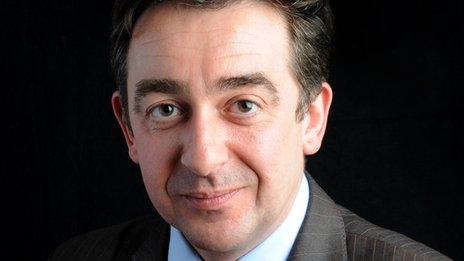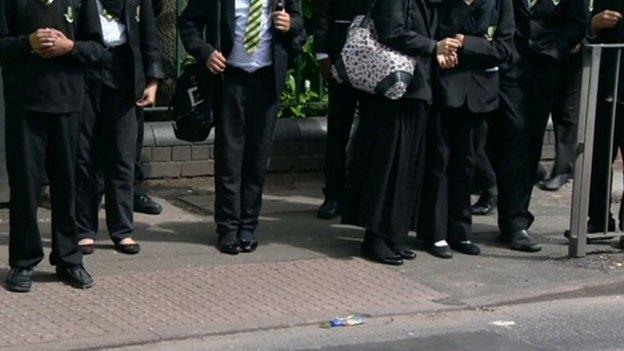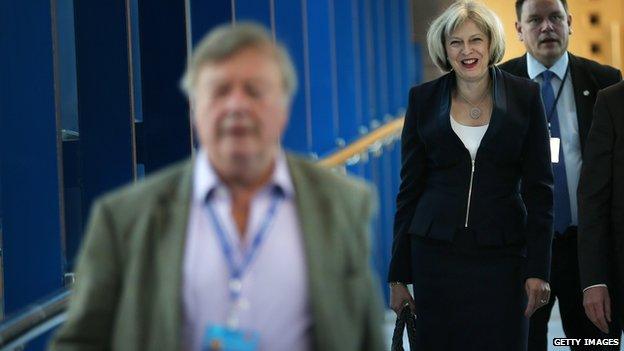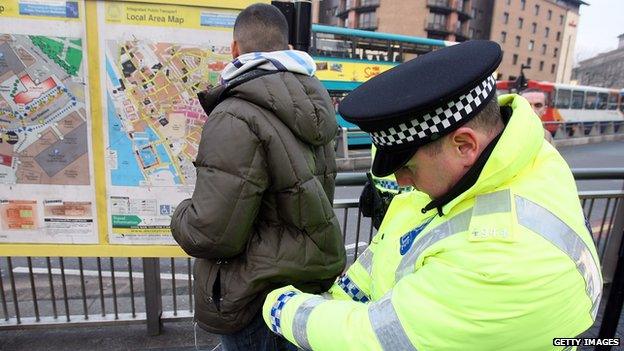Theresa May: British values will prevail over extremists
- Published
Home Secretary Theresa May explains what new powers on extremism will mean
A future Conservative government would seek new powers to ban extremist groups and curb the activities of "harmful" individuals, Theresa May has said.
Banning orders and "extreme disruption" orders will feature in the party's 2015 election manifesto, the home secretary told the party's Birmingham conference.
She got a standing ovation as she said "British values" would prevail in the end in the battle against extremism.
The Liberal Democrats accused her of "peddling misinformation".
Mrs May was among a number of high-profile speakers on the third day of the Tory conference, with Mayor of London Boris Johnson, Health Secretary Jeremy Hunt and Education Secretary Nicky Morgan also taking the stage.
In her speech, the home secretary also:
Called for changes to the way police stop and search powers were used, saying legislation would be used if necessary
Attacked the Liberal Democrats for thwarting attempts to introduce new data monitoring powers
Said the Home Office would take control of all of the government's extremism policies
Warned about the establishment of the "world's first truly terrorist state" in Iraq and Syria
Said she had so far removed the passports of 25 Britons seeking to travel to Syria
The new measures will be targeted at people and groups who "stay just within the law but spread poisonous hatred", she said.

Analysis: Dominic Casciani, home affairs correspondent

The decision to bring extremism strategy into the Home Office is already policy - and it is about more than rearranging the machinery of government: It's a symbol of the tensions inside Whitehall over whether every previous attempt to combat extremism has been a muddled flop.

Mrs May told the conference the UK should not "shy away" from tackling radical Islamist group Islamic State (IS), which has seized large parts of Iraq and Syria.
British hostage David Haines was "murdered simply for being British", she said.
A "studied, careful approach" was required, she said.
Mrs May said a "very complicated battle" was taking place for the "heart and soul" of Islam, saying it was not for Britain to try to resolve it.
But she said it was right that the UK was part of an "international coalition" to tackle IS, also known as Isil.

The new strategy will aim to prevent extremists being appointed to positions of authority, including in schools

Some of the measures have already been discussed in government
If IS succeeded, she said, "we will see the world's first truly terrorist state established only a few hours' flying time from our country".
She added: "We must not flinch, we must not shy away from our responsibility."
In a speech which got a standing ovation from the audience in Birmingham, she said: "In the end, as they have done before, these values, our British values, will win the day and we will prevail."
Email monitoring
Mrs May said that getting access to communications data - details of who called who and when, but not the content of the calls - was vital.
Former Attorney General Dominic Grieve: "It could simply fuel resentment"
She said 12 cases were dropped by the Metropolitan Police in three months because communications data was not available.
In a reference to the government's previous attempt to introduce new powers, she said: "The solution to this crisis of national security was the Communications Data Bill, but two years ago that was torpedoed by the Liberal Democrats."
She said the Liberal Democrat position was "dangerously irresponsible".
Mrs May also said the misuse of stop and search powers was still a "real problem" and said legislation would be used if necessary.
More than 250,000 stops last year were "probably illegal", she said, because they were not carried out with "reasonable grounds for suspicion".
Stop and search could be a "legitimate and useful police tool".
But black people were six times more likely to be stopped than white people, she told the conference, adding that she was determined that "nobody should be stopped and searched because of the colour of their skin".
'Inciting hatred'
Mr Cameron has warned the Islamic State insurgency in Syria and Iraq poses a direct threat to the UK, with 500 British jihadists believed to have travelled to the two countries.
Earlier on Tuesday he told BBC Breakfast: "The problem that we have had is this distinction of saying we will only go after you if you are an extremist that directly supports violence.
"It has left the field open for extremists who know how not to step over the line. But these are people who have radicalised young minds and led to people heading off to Syria or Iraq to take part in this ghastly slaughter."
Among other things, the new strategy outlined by Mrs May will seek to bolster Islamic institutions that operate in a way which is "compatible" with British values and look to improve vetting procedures to prevent extremists being appointed to positions of authority, including in schools.
The government's new approach will bring together existing measures, such as the statutory duty for public bodies to have a counter-radicalisation strategy and enhanced powers for the Charity Commission to close down charities that are a front for extremist activity, with new efforts to improve awareness and training about the risks posed by extremism.

Mrs May said stop and search could be a legitimate useful power
The Home Office will take the lead across government by creating a central hub of knowledge and expertise to advise other departments, the public sector and civil society about the risks of extremism, particularly of infiltration.
At the moment, organisations can only be banned if there is evidence of links to terrorism.
Under the Tories' new proposals, groups that cannot currently be proscribed could be subject to banning orders should ministers "reasonably believe" that they intend to incite religious or racial hatred, to threaten democracy or if there is a pressing need to protect the public from harm, either from a risk of violence, public disorder, harassment or other criminal acts.
The granting of a ban, which would be subject to immediate review by the High Court, would make membership or funding of the organisation concerned a criminal offence.
Broadcasting ban
The police would also be given new powers to apply to a court to impose extreme disruption orders on individuals, using the same criteria.
This could result in those targeted being stopped from taking part in public protests, from being present at all in certain public locations, from associating with named people, from using of conventional broadcast media and from "obtaining any position of authority in an institution where they would have influence over vulnerable individuals or children".
Breach of the restrictions - which would be time limited - would be a criminal offence.
Liberal Democrat peer Lord Carlile, the former independent reviewer of terrorism legislation, told BBC Radio 4's Today programme he did not think some of the measures were sufficiently tough, and called on Mrs May to reintroduce powers to relocate terror suspects to other parts of the country.
Conservative MP Dominic Raab told BBC News there was already a "very wide criminal basis" to prosecute extremist groups.
"I think you need to be very wary about criminalising thoughts and views", he said.
Former Attorney General Dominic Grieve said there was a risk new measures could "simply fuel resentment".
He told BBC Radio 4's The World at One: "If there is to be any restriction on the freedom of expression outside the criminal law - we have to tread very carefully."
Labour has questioned the effectiveness of the strategy, saying all individuals returning from the Middle East should have to undergo a programme of de-radicalisation.
It has called for the government to reintroduce control orders scrapped in 2011.
A Lib Dem spokesman said: "We utterly reject the allegation that the blocking of the Communications Data Bill has put lives at risk."
He said the availability of devices' internet protocol (IP) addresses was the "real problem", accusing the Home Office of "woeful inaction" in dealing with it.
"Liberal Democrats will continue to oppose the Tories' obsessive intrusion into people's lives," he added.
UKIP said the moves paved the way for governments to "block free speech", while campaign group Big Brother Watch said it was "wholly wrong" to label someone as an extremist without a "due legal process".
- Published30 September 2014